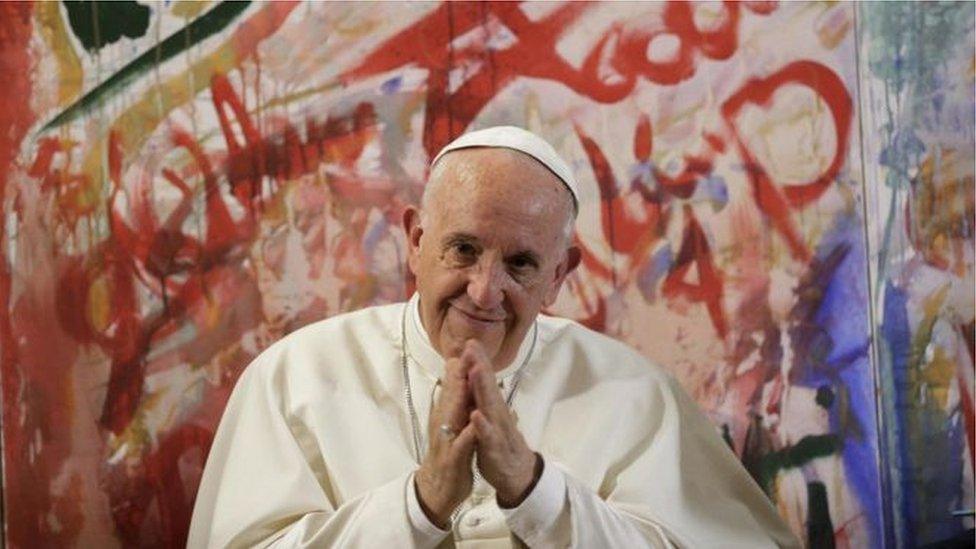Papal visit: Pope shamed by Church's abuse failures
- Published
Pope Francis spoke out on abuse on a visit to Ireland
Pope Francis has said he is ashamed of the Catholic Church's failure to adequately address the "repellent crimes" of sex abuse by clergy.
The Irish prime minister earlier delivered a strong warning to the Pope to take action against clergy involved in child abuse and keeping it secret.
The Pope spent 90 minutes with abuse survivors, reportedly telling them he viewed clerical sex abuse as "filth".
The papal visit is the first to the Irish Republic for 39 years.
It coincides with the World Meeting of Families, a global Catholic gathering held every three years, external.
The Argentine Pope's opening remarks echoed a letter he sent to the world's 1.2bn Roman Catholics this week, in which he condemned the "atrocities" of child abuse and clerical cover-ups.
Pope Francis travels through Dublin city centre on his Popemobile
"I cannot fail to acknowledge the grave scandal caused in Ireland by the abuse of young people by members of the Church charged with responsibility for their protection and education," the Pope told political leaders and dignitaries at Dublin Castle.
"The failure of ecclesiastical authorities - bishops, religious superiors, priests and others - adequately to address these repellent crimes has rightly given rise to outrage, and remains a source of pain and shame for the Catholic community," he said.
"I myself share those sentiments."
The Pope veered off his script when speaking out about abuse, saying he had set out a "greater commitment to eliminating this scourge in the Church, at any cost".
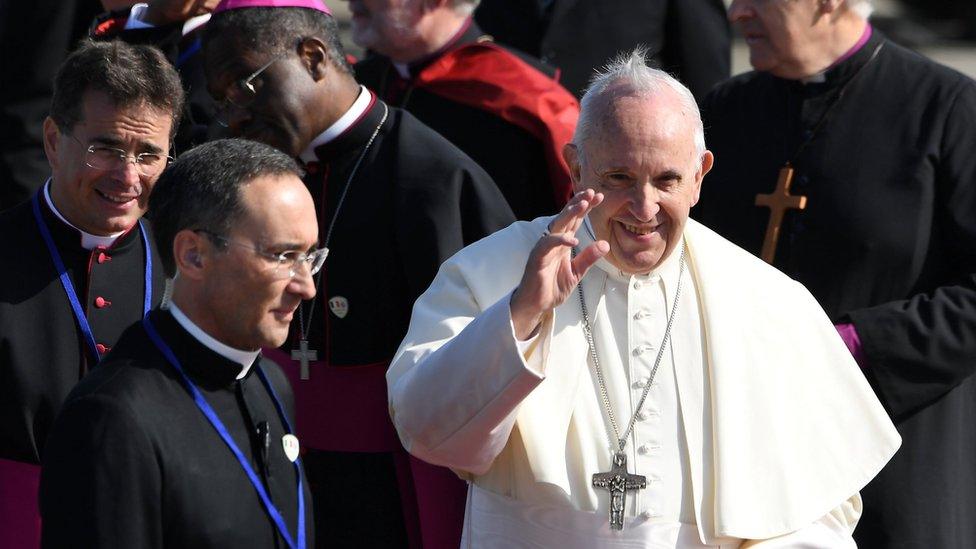
The Pope smiled and waved as at Dublin Airport, but his arrival was more understated than the dramatic tarmac kiss of Pope John Paul II in 1979
He was speaking after Irish PM Leo Varadkar said the failures of the Church, the state and wider society had created a "bitter and broken heritage for so many, leaving a legacy of pain and suffering".
"Magdalene Laundries, mother-and-baby homes, industrial schools, illegal adoptions and clerical child abuse are stains on our state, our society and also the Catholic Church," he said, referring to a series of scandals that have rocked the Irish Church.
"People kept in dark corners, behind closed doors, cries for help that went unheard... Above all, Holy Father, I ask to you to listen to the victims and survivors."
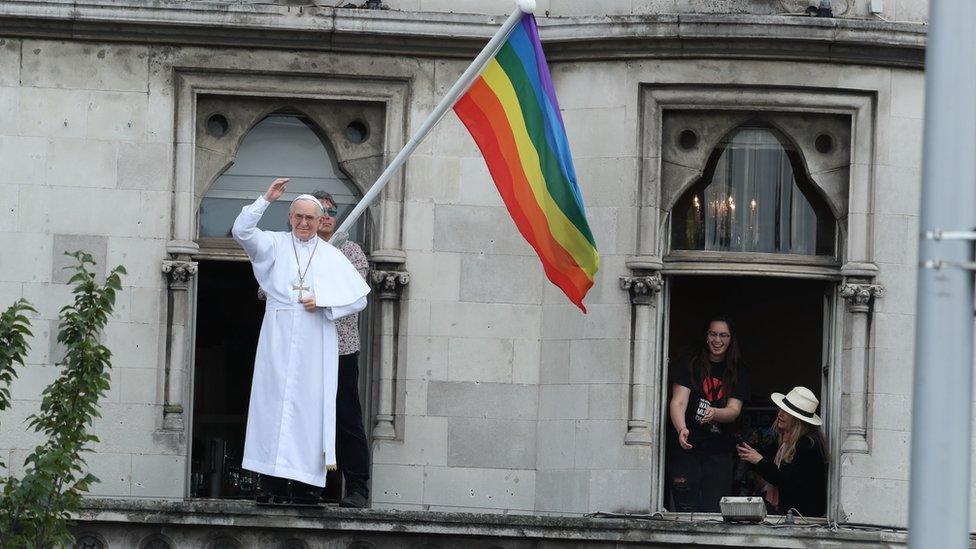
A rainbow flag is flown next to a likeness of Pope Francis as crowds wait on Christchurch, Dublin
Mr Varadkar said there could be zero tolerance for those who abuse children or who facilitate that abuse and that from words action must flow.
He referred to an investigation in the US state of Pennsylvania that found that more than 1,000 identifiable minors had been abused by 300 priests.
Mr Varadkar said the "heartbreaking stories" of "unspeakable crimes", perpetrated by religious officials and then obscured to protect the institutions, was a story "all too tragically familiar" to people in Ireland.

An angry land
By BBC News NI's Leanna Byrne in Dublin
It could be a case of expectations versus reality - the expectation of a charismatic kneel to the ground and a kiss on the tarmac, of fanfare and hysteria.
But that was in 1979 and this is now.
Nearly 40 years after Pope John Paul II received an emphatic welcome, Pope Francis is visiting a different country.
The Republic of Ireland today is more secular, far more liberal and, in many cases, angry.
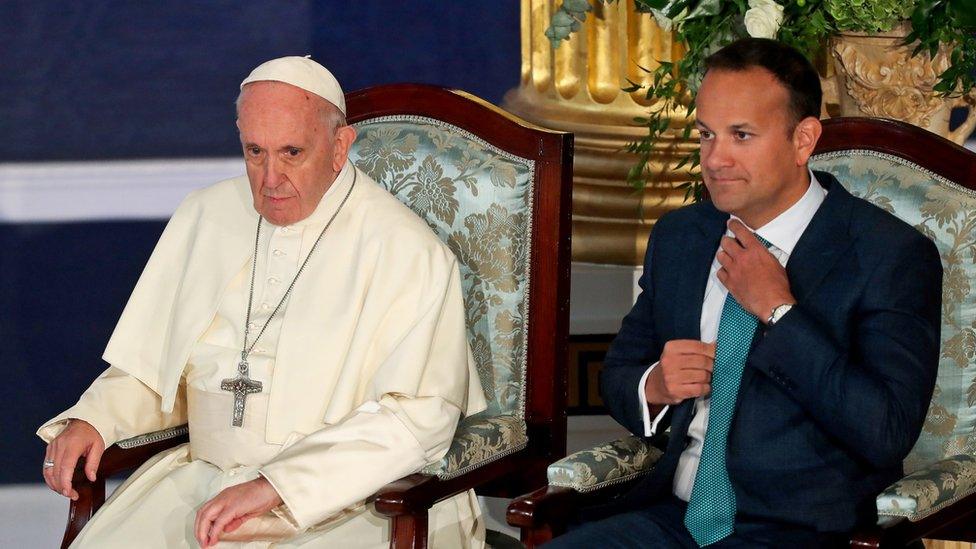
Leo Varadkar said he hoped action, not just words would flow from the Catholic Church

Colm O'Gorman of Amnesty International Ireland, who was abused by a priest for more than two years as a teenager, said the Pope's comments did not go far enough.
"He could have talked to us all in a way that was blunt, that was clear, that was frank, that was human, that was accessible," he said.
Two of the abuse survivors who met the Pope said afterwards he condemned corruption and cover-ups within the Church as "caca".
"Literally filth as one sees in a toilet, his translator clarified," said a statement from Clodagh Malone and Paul Redmond.
Another abuse survivor who was at the meeting, west Belfast priest Fr Patrick McCafferty, said the Pope had promised to "make people resign".
He said: "I got the strong impression that no-one will be exempt from just penalties who have offended, who have covered up.
"The damage [by] those who have covered up could even be said to be worse than [that of] the offenders."
Flowers and vestments
Having been presented with flowers and vestments by children after his aeroplane Shepherd One touched down at Dublin Airport, the Pope was welcomed by President Michael D Higgins at Áras an Uachtaráin (the president's residence).
At St Mary's Pro-Cathedral in Dublin, Pope Francis prayed silently in front of a candle that commemorates abuse victims, before answering questions from couples of all ages on the subject of marriage.
He also visited a Capuchin day centre for the homeless.
On Saturday evening, he presided over a Festival of Families concert in Dublin's Croke Park stadium, which drew a crowd of some 80,000 people.
The world-renowned tenor Andrea Bocelli, country singer Nathan Carter, and acclaimed Irish singer Daniel O'Donnell were among those who performed.
The pontiff will travel to County Mayo on Sunday morning for a visit to Knock Shrine, before returning to Dublin to close the World Meeting of Families at an afternoon Mass in front of an estimated 500,000 people in Phoenix Park.
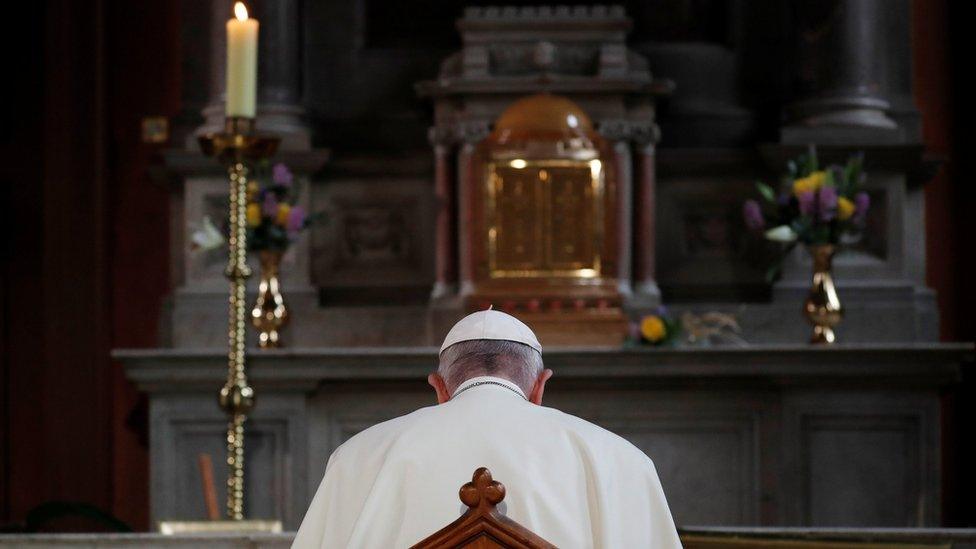
The Pope held a silent prayer in front of a candle that commemorates abuse victims
The Ireland that he is visiting is a different country to that which greeted Pope John Paul II in 1979.
Since the Polish pope's visit, there have been huge changes in public attitudes to social issues including abortion, contraception, divorce and same-sex marriage.

The older population is more likely to describe themselves as Catholic
The country voted for constitutional change on gay marriage in 2015 and voted overwhelmingly to overturn its strict abortion law in May.
The Pope heard Mr Varadkar, a gay man, speak out against the traditional Catholic teaching on the family.
He said that the Republic of Ireland had modernised its laws, "understanding that marriages do not always work, that women should make their own decisions and that families come in many forms" - including those headed by a lone parent, same-sex parents or parents who are divorced and remarried.
Ireland - between two popes

Papal visit to Ireland: Itinerary highlights
When and where will the Pope be visiting? Find out here
Saturday 25 August
08:15 - Departure by plane from Rome for Dublin
10:30 - Arrival at Dublin Airport for official welcome
10:45 - Transfer to Áras an Uachtaráin (Irish president's residence)
11:15 - Welcome ceremony with President Michael D. Higgins
12:10 - Arrival at Dublin Castle for meeting with authorities, civil society and diplomatic corps
15:30 - Visit to St Mary's Pro Cathedral
16:30 - Private visit to the Capuchin Day Centre, a centre for homeless people
19:45 - Preside at the Festival of Families at Croke Park stadium
Sunday 26 August
08:40 - Departure by plane for Knock
09:45 - Arrival at Knock Shrine for visit to the Apparition Chapel and recitation of the Angelus
11:15 - Departure by plane for Dublin
12:30 - Lunch with the Papal Delegation
15:00 - Closing Papal Mass of the World Meeting of Families in Phoenix Park
18:30 - Farewell ceremony at Dublin Airport
18:45 - Departure for Rome
23:00 - Arrival in Rome

You can follow minute-by-minute updates on the Pope's visit here on the BBC News website.
Switch on for Sunday's Newsline showing highlights from the visit at 22:30 BST.
On radio, join Seamus McKee for a special extended The Sunday News at 13:00.
- Published26 August 2018

- Published25 August 2018
- Published20 August 2018
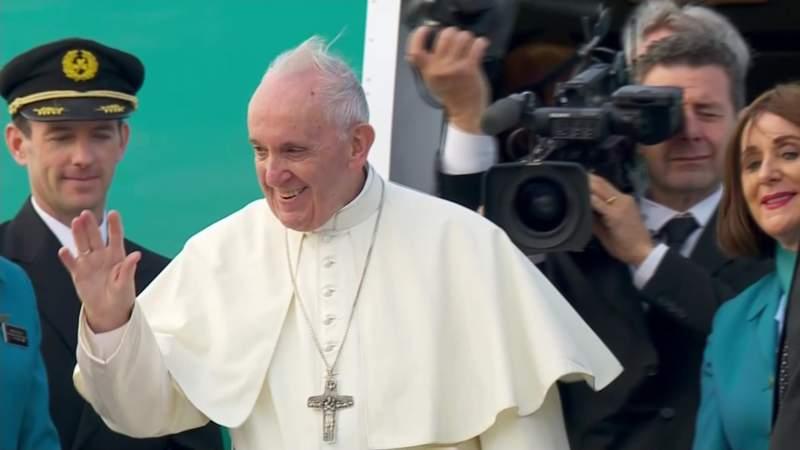
- Published5 October 2021
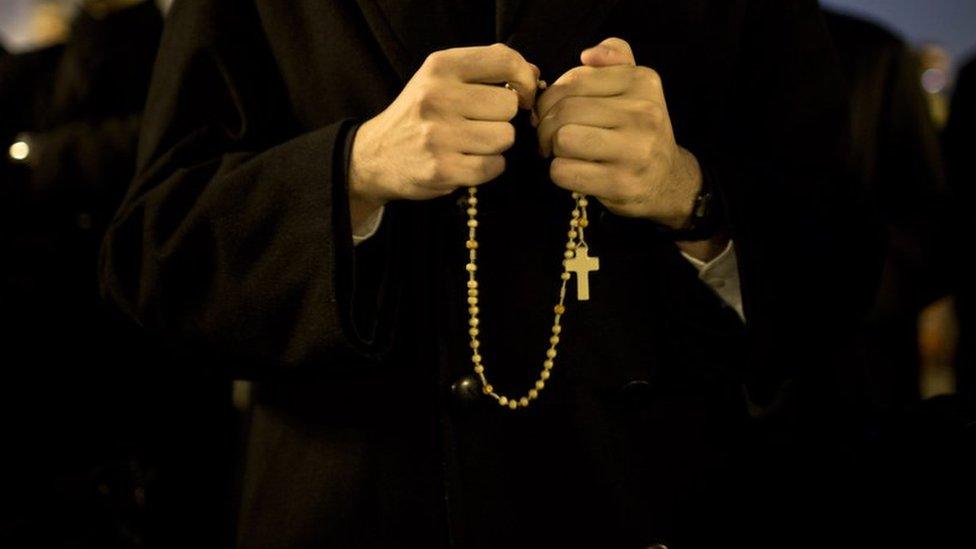
- Published24 August 2018
